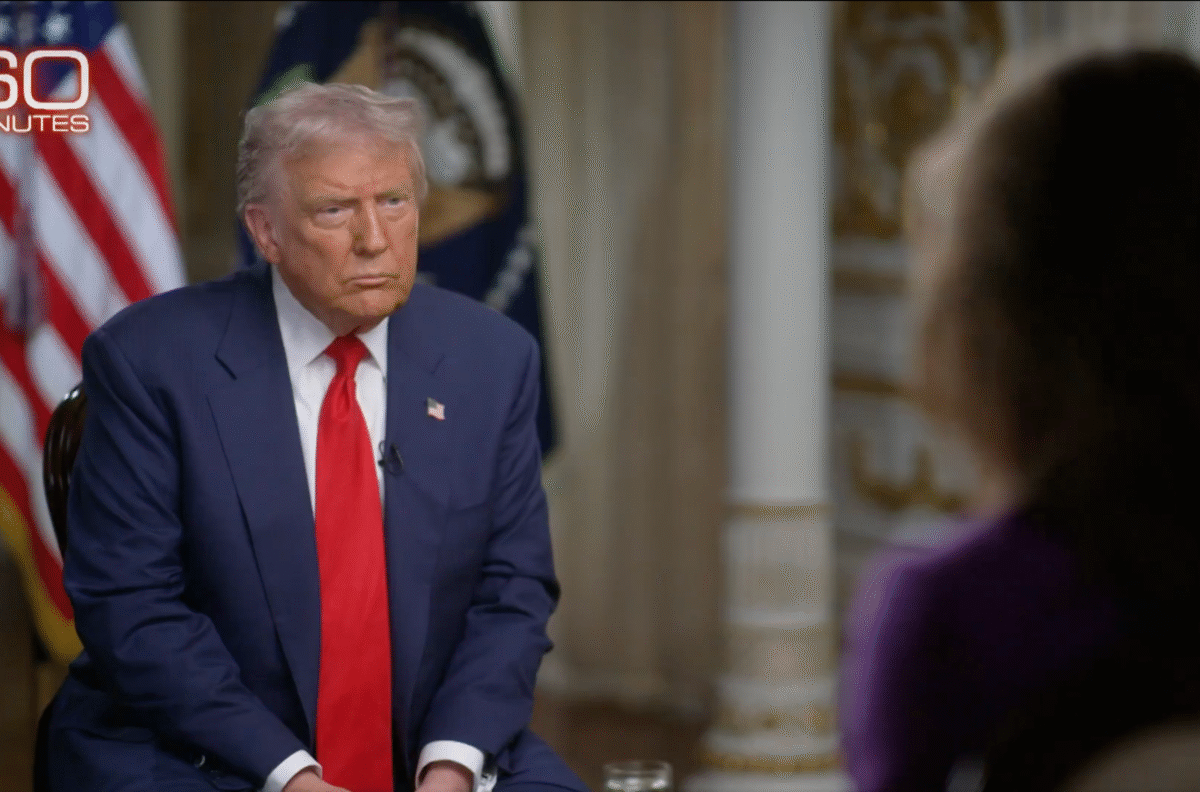Inside 60 Minutes: Donald Trump’s 90-Minute Mar-a-Lago sit-down, lawsuit settlement & foreign-policy bombshells

President Trump at his Mar-a-Lago residence during the televised 60 Minutes interview. Image Source: 60 Minutes/X
In his first major broadcast appearance on 60 Minutes in five years, President Donald Trump sat down for a 90-minute session at his Mar-a-Lago estate that aired Sunday evening. He addressed everything from his $16 million settlement with the show’s parent company to bold statements on immigration, China, Venezuela and the ongoing U.S. government shutdown. The interview was widely dissected, both for its substance and its optics.
Lawsuit Settlement With CBS: How It Framed the Interview
Mr. Trump reminded viewers that he sued CBS and its program 60 Minutes in November 2024, claiming the network deceptively edited a debate interview with then-Vice President Kamala Harris, and that he ultimately accepted a $16 million settlement with Paramount Global in July 2025.
He told interviewer Norah O’Donnell “they paid me a lotta money,” adding the network “didn’t want to embarrass you.”
This backdrop influenced the tone of the interview, Trump entered aware the network had settled and he would again be under the lens of edits, public relations and media accountability.
Immigration and Domestic Enforcement: “Haven’t Gone Far Enough”
One of the sharpest exchanges came when O’Donnell asked about domestic immigration enforcement: Mr Trump said that U.S. immigration-raids “haven’t gone far enough,” blaming federal judges nominated by his predecessor and promising a more aggressive deportation agenda.
Pressed on whether innocent labourers and undocumented workers would be swept up, Trump replied: “We have to start off with a policy … you came in illegally, you’re going to go out.”
The remarks underscore how central immigration remains in his domestic agenda, and how the interview provided a platform for him to sharpen the message.
Foreign-Policy Reveals: Venezuela, Taiwan, and Nuclear Testing
Trump signalled forceful rhetoric toward Venezuela, saying President Nicolás Maduro’s days are “numbered,” yet doubting the U.S. will go to war. On Taiwan, Trump refused to commit to U.S. defense of the island if challenged by Xi Jinping’s China, stating Xi “understands the answer” without giving specifics.
He also stated that the U.S. must test nuclear weapons “like other countries do,” referencing alleged secret tests by Russia and China. Together, these statements suggest a tilt toward unpredictability in major-power diplomacy and defence policy.
READ ALSO
Tariff truce & turf wars: Trump and Xi meeting yields soybeans, rare earths and fentanyl deal
Government Shutdown, Economy and Media Framing
The interview aired amid the ongoing U.S. government shutdown. Trump used the opportunity to shift blame onto Democrats and insisted he would not be “extorted” into reopening. When confronted on cost-of-living pressures and healthcare promises, Trump repeatedly pointed back to Democratic obstruction while offering few concrete new policy details.
Media analysts noted that while O’Donnell asked direct questions, some critics argue the show did not adequately interject to correct misleading claims, a debate echoing broader concerns about how interviewers handle political figures like Trump.
READ ALSO
Optics & Health Questions: What the Coverage Missed
In addition to policy highlights, several commentators focused on the physical appearance and conduct of the 79-year-old president during the segment, descriptions included him appearing sweaty and fatigued.
The exchange between Trump and O’Donnell, who addressed him repeatedly as “Mr Trump” rather than “Mr President”, also drew criticism from his supporters as a breach of protocol.
Why This Interview Matters
This 60 Minutes sit-down is significant because it:
- Occurred exactly one year after Trump sued the network, underscoring a charged media-political backdrop.
- Allowed Trump to articulate his vision of domestic and foreign policy ahead of the 2028 election cycle.
- Re-established 60 Minutes as a major platform for presidential communication, albeit one marked by unresolved trust tensions.
- Highlighted how narratives on immigration, China, Venezuela and media influence are being reframed publicly from the Oval Office.
FAQ
What did Donald Trump discuss in his 60 Minutes interview?
President Trump addressed a wide range of issues: his settlement with CBS’s 60 Minutes parent company, U.S. immigration enforcement, Venezuela policy, Taiwan defence commitments, nuclear-testing strategy and the current government shutdown.
Why did Trump sue CBS and 60 Minutes?
In November 2024, Trump filed a lawsuit alleging that 60 Minutes deceptively edited an interview with then-Vice President Kamala Harris in a way that swayed the election. The case was settled in July 2025 for $16 million, with no admission of wrongdoing by CBS.
What were Trump’s remarks on U.S. immigration enforcement during the interview?
Trump stated that his immigration raids “haven’t gone far enough,” blamed liberal judges for blocking his agenda and emphasized that those who entered illegally must leave, a signal of intensifying enforcement.
Did Trump commit to defending Taiwan if China attacks?
No. When asked, Trump declined to explicitly state he would order U.S. forces to defend Taiwan, saying instead that Chinese President Xi Jinping “understands the answer.”
What did Trump say about Venezuela and war?
Trump said Venezuela’s President Maduro’s days are “numbered,” but added he doubts the U.S. will actually go to war with Venezuela at this time.
How did the interview segment handle the settlement with CBS?
Trump boasted that 60 Minutes “paid me a lotta money,” referencing the settlement, and he praised the show’s new leadership under the network’s merger ownership change.
Why is this interview considered significant?
It marks Trump’s major televised sit-down since resuming the presidency, offers insight into his current strategy on key domestic and foreign-policy issues, and reflects the evolving relationship between the White House and major media institutions.

